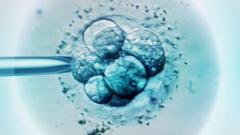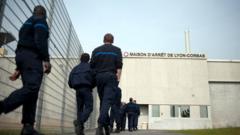An Australian fertility clinic, Monash IVF, is under scrutiny after a significant error led to a woman giving birth to another couple's baby due to embryo mix-up. This troubling revelation has reignited discussions over the standards and practices within assisted reproductive technology services.
**Australia's Fertility Clinic Faces Backlash After Embryo Mix-Up Leads to Stranger's Birth**

**Australia's Fertility Clinic Faces Backlash After Embryo Mix-Up Leads to Stranger's Birth**
A recent incident in Australia where a woman gave birth to a stranger's child highlights severe lapses in fertility clinic protocols.
In Brisbane, Queensland, Monash IVF has taken the blame for this human error, which occurred when embryos from a different patient were mistakenly thawed and implanted, unbeknownst to the mother concerned. According to CEO Michael Knaap, the clinic is deeply remorseful and committed to preventing such tragic mistakes in the future.
The alarming incident came to light when the rightful parents requested to transfer their remaining frozen embryos to another facility. Investigations have now been initiated to ascertain how such a fundamental error could have occurred, with Monash IVF asserting that this is likely an isolated incident.
Earlier in 2022, Monash IVF was already in the headlines after a historic A$56 million compensation settlement due to the destruction of embryos, improperly classified as non-viable. A blunder during genetic testing had affected over 700 patients, leading to the loss of embryos that were, in fact, fertile.
Fertility treatments, including IVF, remain a costly and complex procedure, with 20,690 babies born as a result of IVF in Australia and New Zealand in 2021 alone, as reported by the University of New South Wales. The latest incident raises serious questions about the protocols in place to protect patients from similar occurrences in the future and emphasizes the need for stringent oversight in the fertility industry.
The alarming incident came to light when the rightful parents requested to transfer their remaining frozen embryos to another facility. Investigations have now been initiated to ascertain how such a fundamental error could have occurred, with Monash IVF asserting that this is likely an isolated incident.
Earlier in 2022, Monash IVF was already in the headlines after a historic A$56 million compensation settlement due to the destruction of embryos, improperly classified as non-viable. A blunder during genetic testing had affected over 700 patients, leading to the loss of embryos that were, in fact, fertile.
Fertility treatments, including IVF, remain a costly and complex procedure, with 20,690 babies born as a result of IVF in Australia and New Zealand in 2021 alone, as reported by the University of New South Wales. The latest incident raises serious questions about the protocols in place to protect patients from similar occurrences in the future and emphasizes the need for stringent oversight in the fertility industry.






















